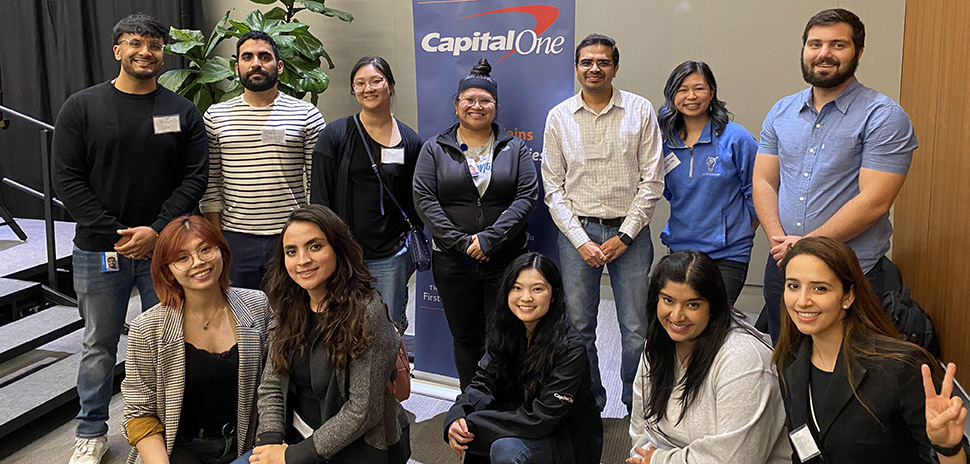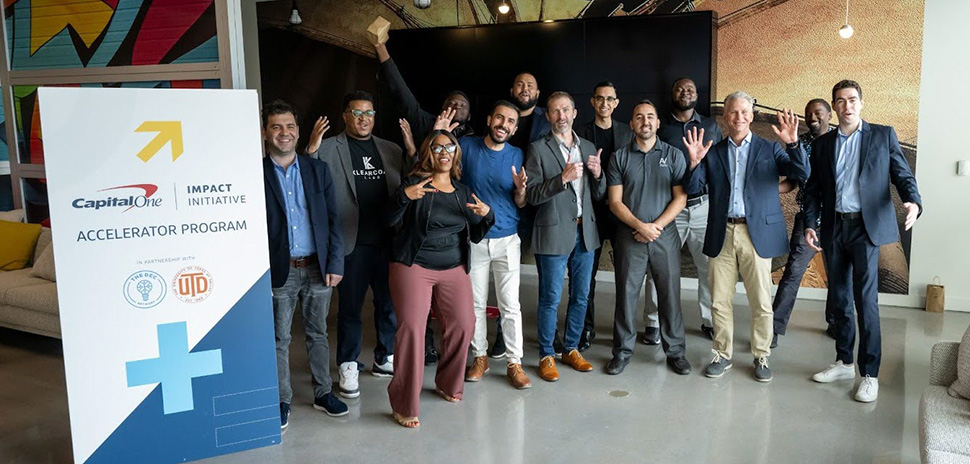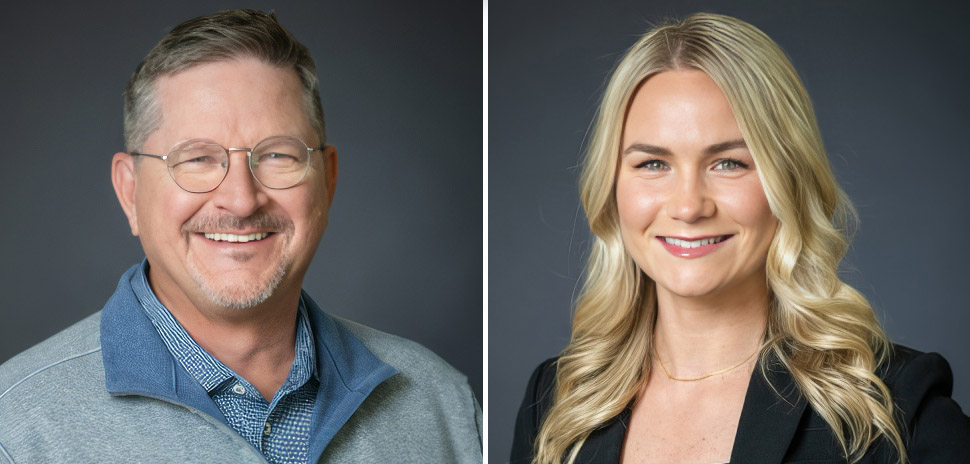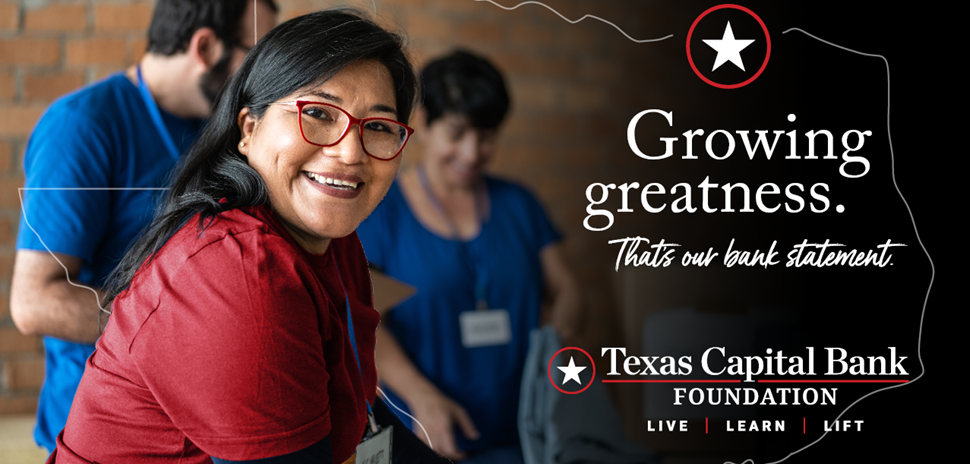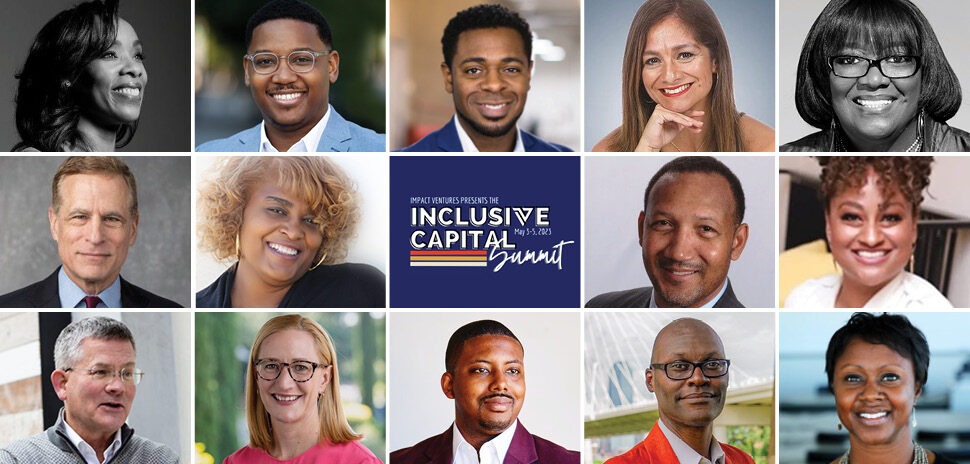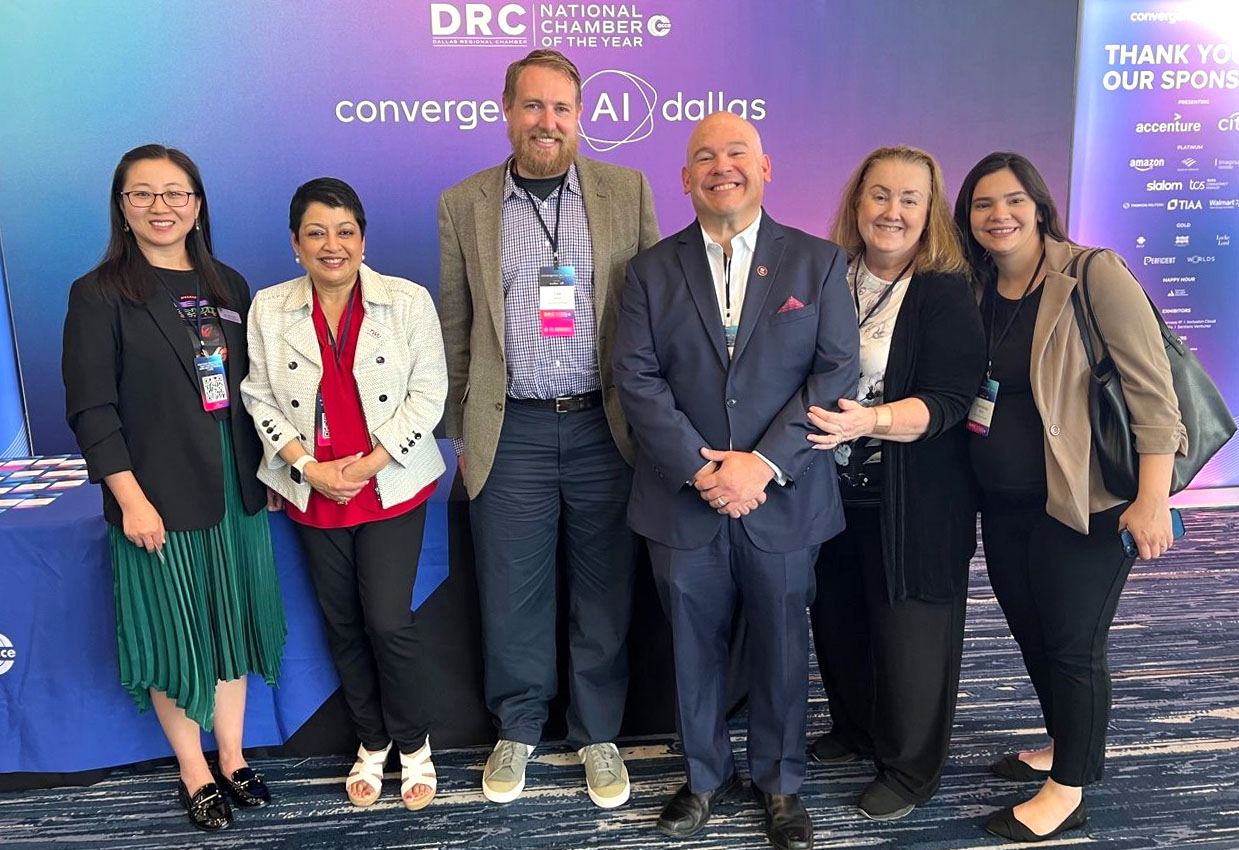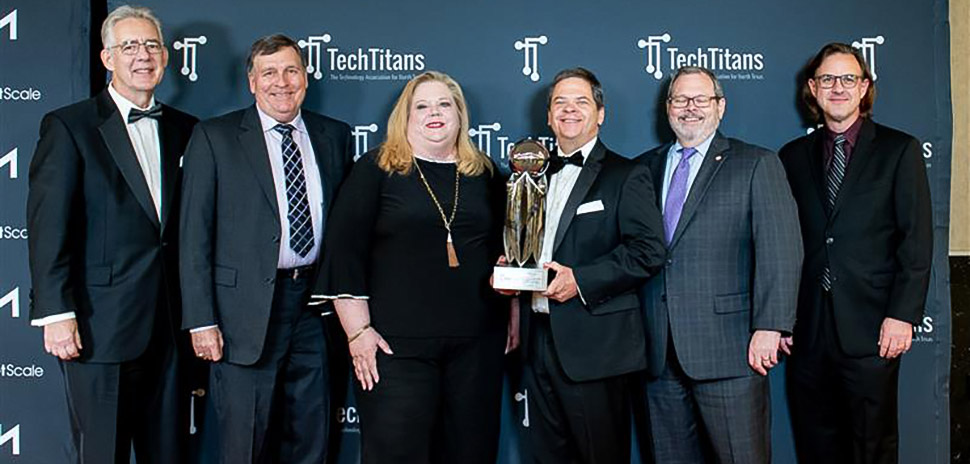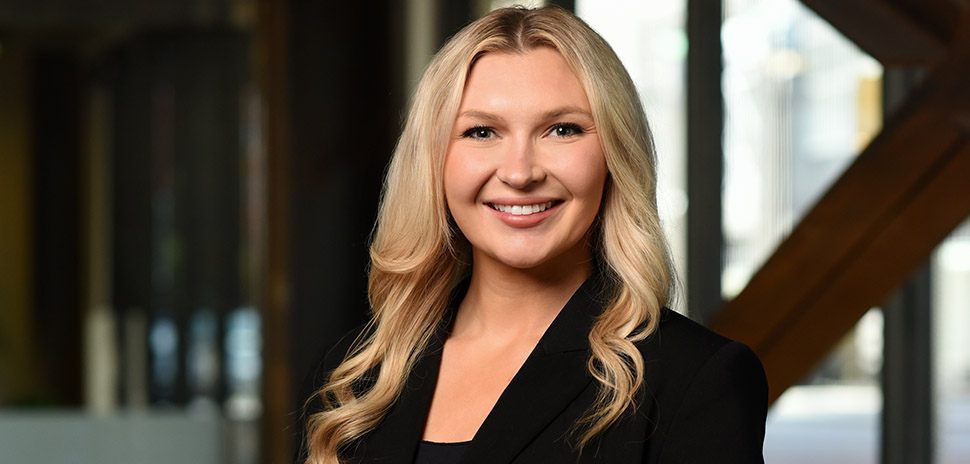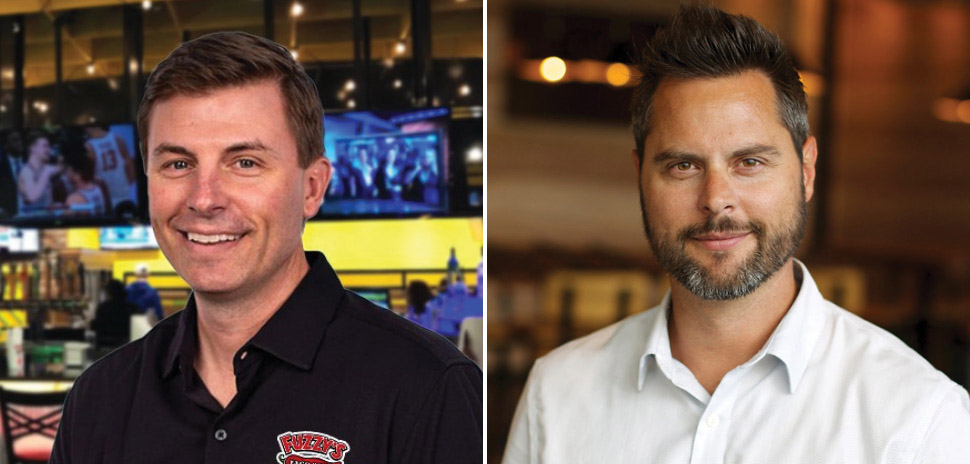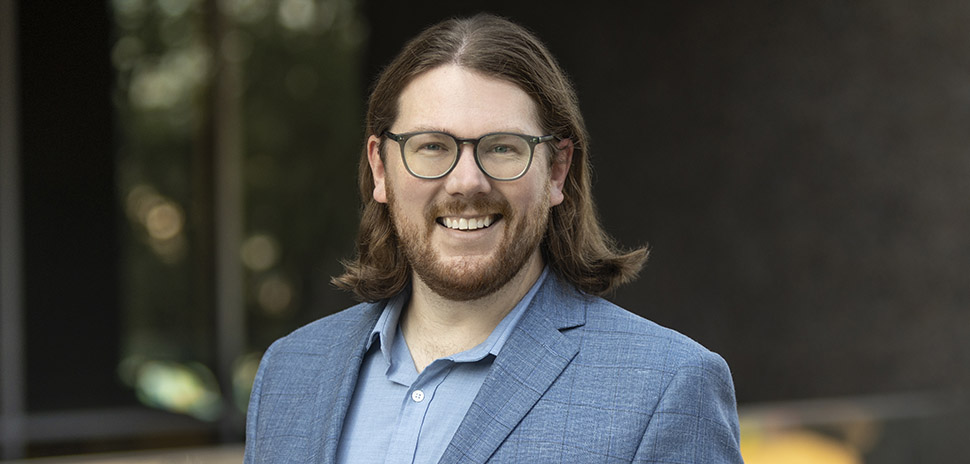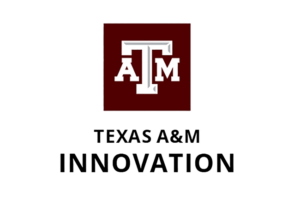![]() Erwin Linares, the son of immigrants from El Salvador and a first-generation student at The University of Texas at Dallas (UTD), knows the importance of internships and outside work to students pursuing a college degree.
Erwin Linares, the son of immigrants from El Salvador and a first-generation student at The University of Texas at Dallas (UTD), knows the importance of internships and outside work to students pursuing a college degree.
Linares, 22, not only has a part-time job refereeing club-game soccer matches, but he also works as a data-visualization intern for The Upper New Review, an environmental literary arts magazine.
Even so, the senior in business analytics is seeking opportunities to take on still more. “I do as much as I can in terms of getting experience,” he says—including looking for additional internships.
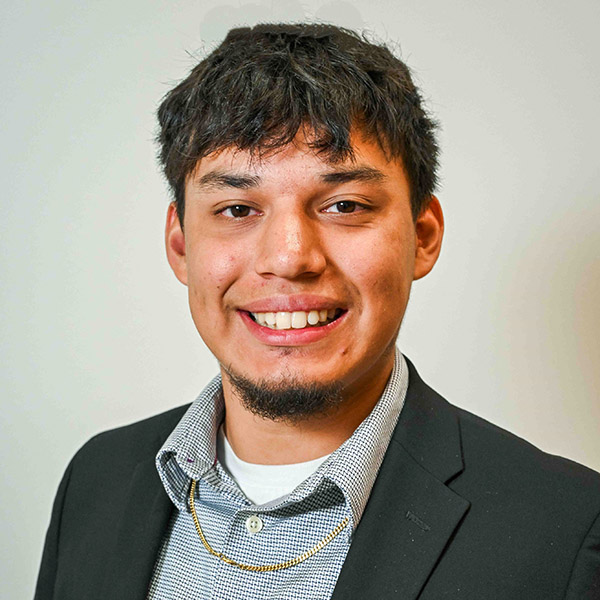
Erwin Linares [Courtesy photo]
Linares is hardly alone. Indeed, securing intern opportunities and learning how to network are top priorities for first-generation college students—or students whose parents did not complete a four-year, college or university degree. That was stressed at a recent Capital One First-Generation Professionals Panel at UTD for first-generation students and alumni.
Moderated by D’ric Jackson of UTD’s Office of Undergraduate Education, the panel included Capital One employees who once were first-generation students themselves.
The term “first generation,” written into federal law more than 40 years ago, has received fresh attention lately as universities focus on opportunities for low-income and first-generation students, many of whom are from underrepresented groups. Such students, the schools realize, can face special challenges in applying for financial aid, juggling course loads with full-time jobs, and dealing with other unique demands of higher education.
In many ways, first-generation students are having to figure these things out on their own. That’s why the company has partnered with North Texas universities to break down the structural barriers to access and opportunity for first-generation students, in alignment with Capital One’s Impact Initiative to support growth in underserved communities and advance socioeconomic mobility by closing gaps in equity and opportunity.
In 2023 alone, Capital One engaged nearly 1,000 first-generation students and parents at UTD, The University of North Texas, and Paul Quinn College with financial education and workforce development programs.
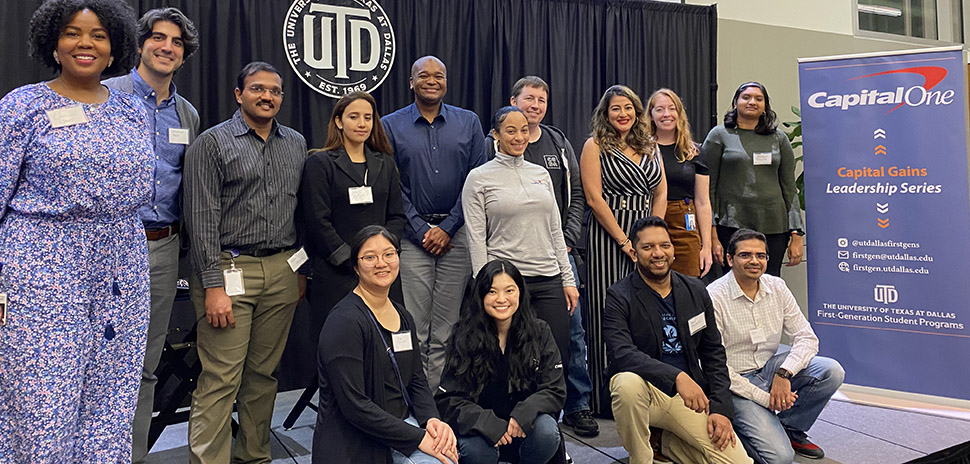
Next-gen leaders on stage at Capital One’s Capital Gains Leadership Series event at UT Dallas. [Photo: Capital One]
Work at what you love—or what will pay the bills?
Take the UTD panel, for example. Addressing a packed house full of students, the Capital One panelists shared how their first-generation status had affected their experiences at college.
“Being from a ‘first-gen’ immigrant family, my parents had to do what they could do—hard labor. But for me, it was sort of, ‘the world is my oyster,’ and I could pursue whatever I wanted to,” recalled Carrie Norman, who’s now a software engineering manager at Capital One.
“There was also a constant question of whether or not I should pursue something that was really possible, or something I had a passion for,” she said. “It’s one of those motivational things where you’re encouraged by your family to do things that you love, but at the same time to do things that will pay the bills. There was that—and also, not necessarily having the pathway laid out for you in advance,” Norman said. “So, those were areas where I had to figure things out for myself.”
Sumedh Seghal, a senior business analyst at Capital One, offered the first-generation attendees important tips for getting ahead by networking. “When it comes to creating or building a network while you’re here at a university, clubs and professional organizations allow you to do that very easily,” Seghal said. “Then, stick around and talk to the people in the room and exchange contact information.”
“When I graduated from UTD two years ago, it was super-important for me to figure out what I wanted to do after graduating,” he continued. “That process revolved a lot around networking. Coming in as a finance major as I did, you heard everyone say, ‘I want to do investment banking.’ But then you’d ask, ‘What does an investment banker actually do?’ and they didn’t really have an answer.”
“So, to figure that out, you have to talk to one,” Seghal said. “That can seem super-scary, because you think they have way more experience, or they’re smarter than you. But at the end of the day, it’s important to remember that everyone’s just a person—as long as you’re professional and respectful of their time as well.”
Other Capital One employees on the panel were Cedric Scott, a unit manager; Reginald Bradshaw, a lead software engineer; and Rosa Esponda, a virtual business banker.
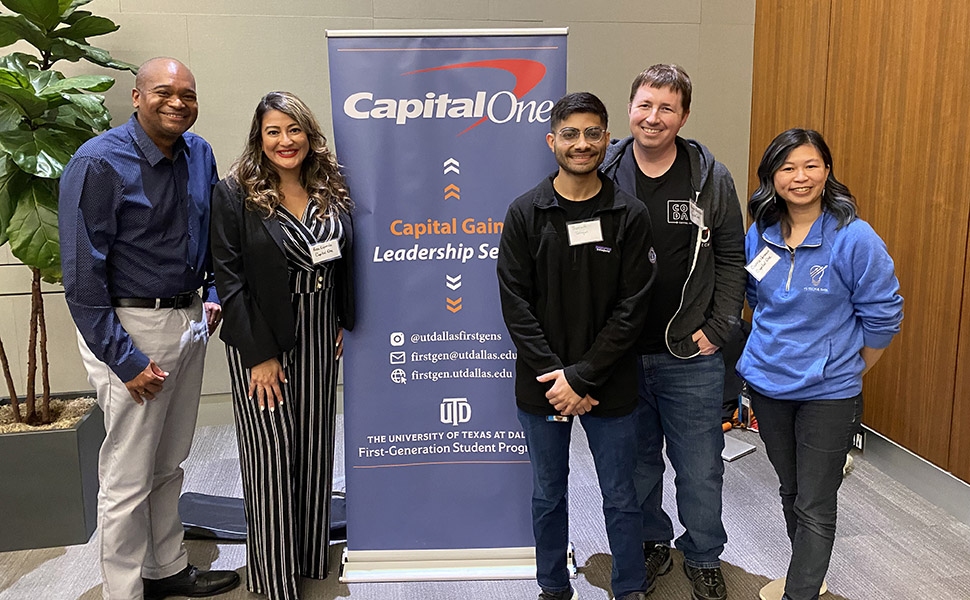
First-gen leaders from left: Cedric Scott, Unit Manager; Rosa Esponda, Virtual Business Banker II; Sumedh Sehgal, Senior Business Analyst (UTD Alumni, Class of 2021); Reginald Bradshaw, Lead Software Engineer (UTD Alumni); and Carrie Norman, Software Engineering Manager. [Photo: Capital One]
‘You’re doing something hard’
One person assisting with the Capital One event was 37-year-old Laura Hopkins, a first-generation student who took an unconventional route to enrolling at UTD in 2022.
A Dallas native whose parents both dropped out of community college to take jobs after she came along, Hopkins graduated from high school in Richardson in 2005 and, the following year, started classes at Dallas College’s Richland campus. But then “the reality of being an adult” set in, Hopkins says, and she began working full-time, eventually dropping all her classes as she helped her parents make ends meet.
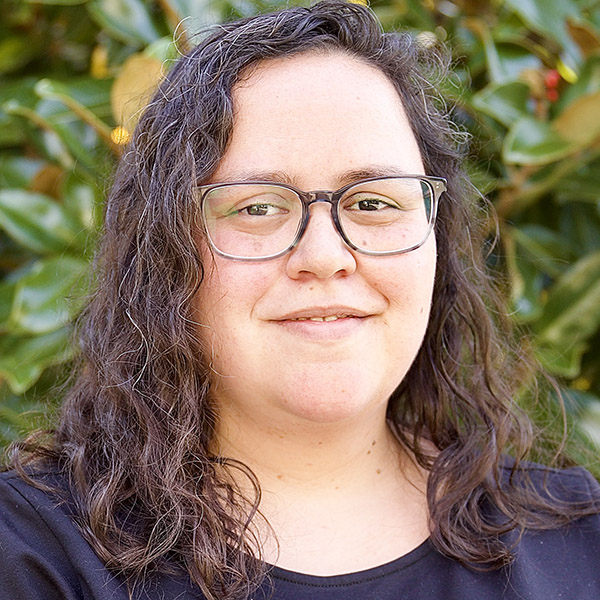
Laura Hughey Hopkins [Courtesy photo]
After “bouncing around” in various jobs for more than a decade, Hopkins returned to Richland in 2018 and finally earned her associate’s degree. She also started working for a CPA and realized that she “really loved” numbers and preparing tax returns.
After she and her partner saved up enough money for her to be able to quit working and return to school, Hopkins was accepted into the Professional Program in Accounting at UTD’s Naveen Jindal School of Management. The fast-track program could allow her to graduate with bachelor’s and master’s degrees by the spring of 2026.
While most UTD students seem to be in their late teens or early 20s, Hopkins says there are also many first-generation students on campus who are in their 20s, 30s, and 40s, which helps her realize she’s not alone.
“There are people here who have your same story,” she says. “And if you’re struggling, it’s not because you’re not good enough, or your family is not good enough.” With its Office of Undergraduate Education, “UTD is telling us, ‘You’re doing something hard, and we want to support you, and you don’t have to go it alone in the dark,” Hopkins says.
“I’m really proud to be ‘first-gen’. I feel like I’m making my family proud, because it’s not just for me—it’s for them, too. And when I’m doing their taxes one day, they’re going to be really grateful!”
The benefits of expanding your horizons
Like Hopkins, Erwin Linares, the part-time club-game soccer referee and UTD senior in business analytics, also came to the university via the Dallas College system.
He enrolled at North Lake following graduation from high school in Grand Prairie in 2020. Linares has lived in Texas since he was 2, though he was born in California’s San Fernando Valley. His parents had moved there after fleeing El Salvador during that country’s 12-year civil war.
Fluent in both English and Spanish, Linares says he “ended up really loving” his business analytics classes at UTD, which have taught him how to analyze, prepare, visualize, and share data.
While he agrees there can be unique pressures on first-generation students like him, he adds that he’s motivated to “take it up a notch” for the sake of his parents. “They’ve always been pressuring me to make the most of what I can, and that’s really what I try to do every day,” he says. “I just hope to make them proud, if that makes sense.
“When I started taking school a little more seriously, I realized where my parents came from, and how they had to grow up with little to no education,” Linares continues. “My dad didn’t even finish middle school, because they were in the middle of a war. So, understanding that part brought me to the mindset of, ‘I have to do the best I can with what I have,’ sort of representing my family in that way. They came here and did as much as they could with what they knew, and seeing them succeed kind of pushes me, lights a fire within me, to succeed as well.”
Does he have any advice for other first-generation students?
“Just keep pushing,” Linares replies. “You have to expand your horizons a little bit, because you’re so used to a certain setting. But to make it, to keep going and to be successful, you’re going to have to start expanding your horizons, make new relations, and just try your hardest. Because you’re the one that’s paving the way for yourself.”
Capital One is a Dallas Innovates Platinum partner. “‘You’re Paving the Way for Yourself’: First-Generation College Students Confront—and Overcome—Unique Challenges” was written and edited by Dallas Innovates’ brand studio.
![]()
Get on the list.
Dallas Innovates, every day.
Sign up to keep your eye on what’s new and next in Dallas-Fort Worth, every day.


